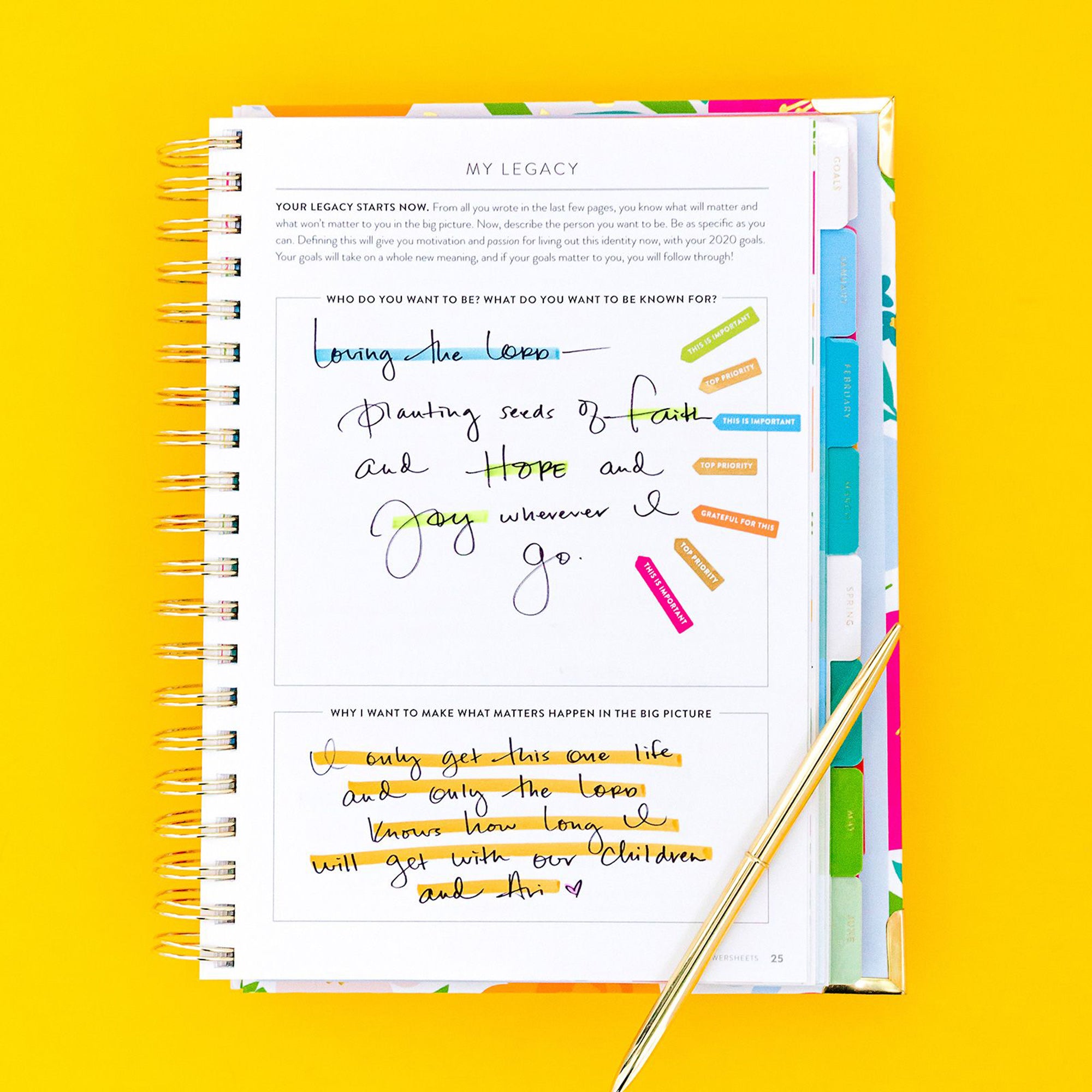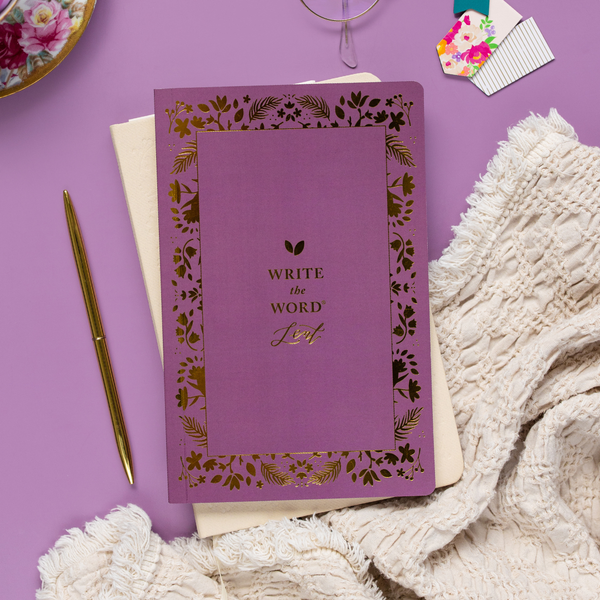"Legacy. What is a legacy? It's planting seeds in a garden you never get to see."
With thanks to Lin Manuel Miranda, because I couldn't have said it better myself! (How did he know we love gardens around here?)
Like you, we've been thinking even more than usual about legacy, and big-picture vision, and what, exactly, our small steps today are adding up to. This is natural in a time of such uncertainty, particularly one that involves our health and the health of our loved ones.
Maybe you've been thinking about these things, too. But these concepts can sound so big and lofty, and if you aren't a PowerSheets® user, they might feel intimidating! So today, we wanted to break down the concept of legacy—what one is, why they matter, and how to make your own.
What is a legacy?
We're all familiar with the concept of a legacy—something of value passed down or received from someone who came before us. A legacy can also be defined as a gift, a definition I love. Traditionally, it would be a monetary gift, but here we'll think of it in a much more expansive sense: a legacy could be a gift of knowledge, or kindness, or love for the outdoors.
What does a legacy look like?
Legacies come in all shapes and sizes:
- A collection of beloved, ingredient-splattered recipes
- Policies and procedures put in place over many years that help things run smoothly at a nonprofit
- A love of camping nurtured in one generation and passed on to the next
- A family known for making music together
- An advocate for adoption who inspired three other families to get involved
- A business started by a mom and passed on to her daughter
- A hearty, throw-your-head-back laugh whose joy is remembered by all who heard it
- The ability to welcome everyone to the table, know matter how unlikely or disconnected
Legacies look like memories from time spent together. They look like influence, over one or many. They look like stories. They look like beloved objects, no matter the monetary value (and their worth usually comes from the stories attached). Legacies are the result of many purposeful actions over a long period of time—often years, or even decades!
What kind of person leaves a legacy?
Maybe you're thinking you're just a "normal person." You're just a mom, or just an employee, or just a volunteer—just a regular old person, nothing fancy. While we'd argue you're pretty spectacular just as you are, even the most "common" person leaves a legacy. In fact, because legacies are often most strongly developed through one-on-one, long-term relationships, those with a small circle might leave the deepest footprints!
Loving the people around you with your time and attention, living with integrity so you're a trustworthy person to follow, and growing what you've been given so you have something to pass on—these are all parts of leaving a legacy, and they're not limited to people with big followings, big families, or big bank accounts.
Why should I care about leaving a legacy?
The need for significance—for having mattered in the world—is a strong and well-established human need. Likewise, most humans feel an innate desire to help others, especially their family members. Whether you've named these two feelings or not, you've probably felt them to some degree—and they're both great reasons to think intentionally about crafting a legacy!
Legacies are also strongly linked to hope (and who doesn't need more hope right now?!). Hope is the belief that the future will be better than today, and when you build your legacy, you're actively building that better future.
How do you create a legacy?
A legacy may be what's left after you're gone, but the work of making one is done while you're still here. The luckiest of us get to see and enjoy the fruit of our legacy while we're still here, too! Though your most enduring and powerful legacy might be one you never expected or even intentionally cultivated, you can get started by asking yourself two simple questions:
- What do I have of value to pass on?
- Who is within my circle of influence?
This does not have to be complicated—start small and with what you know. For example, your love of celebrating, your care for your garden, your easy conversation with new friends, your ability to lead a lead a complicated conversation—these are all things worthy of being passed on. Your circle of influence might include your children, your spouse, your siblings, your neighbors, your best friends, your students, your nieces and nephews, or your colleagues.
From there, like all good things, legacies are created one step at a time—one hug at a time, one lunch at a time, one conversation, one email, one phone call, one "are you busy" or "do you have a minute" at a time. Of course, the best place we know to actually live out those small steps is your PowerSheets goal planner.
Your legacy might add up to something monumental one day, but it will be built from the smallest blocks.
We're going to be chatting about the idea of legacy from a few different angles over the next few weeks here and on Lara's blog, and we're excited to hear your thoughts, too! For today, I'll leave you with a few words from Team Cultivate:
- "Creating memories for my family filled with joy, love, and comfort, especially during this pandemic, is one of my biggest goals. I hope my legacy evokes the feeling of unconditional love and joy-filled moments of fun. When I think of legacy, I am often reminded of the quote from Maya Angelou. She said, 'I've learned that people will forget what you said, people will forget what you did, but people will never forget how you made them feel.' That is legacy to me." — Marissa
- "To me, legacy is more about HOW I live and less about my accomplishments. It's less about my name being remembered and more about leaving memories, encouragement, and inspiration for my children/family/community to be impacted by and then to build off of themselves. Our kids LOVE hearing about how Sam and I met, what they were like as babies, what things I loved as a kid. I think this shows that people love to be part of a bigger story, and I think sharing and creating legacy does that." — Meg
- "To me, legacy means spending my life loving the people around me well and planting seeds of faith. If I do this, I will feel like I served my purpose and lived a meaningful life." — Mackenzie
- "Legacy is the story that my grandchildren will tell their children about our family long after I'm gone. It's the seeds we plant today that are still producing fruit for generations to come. I want to leave my children with a legacy of joy, laughter, integrity and faith." — Irene
- "When I hear the word legacy, I immediately think, 'what do I want to leave behind?" It makes me pause and reflect on my life, my priorities, and my goals. It puts into question every decision I make––do I want this to be my legacy? Is this what I want to leave behind? For me, I want to leave a legacy that is founded on faith. One that has nothing to do with me, but everything to do with the Lord. I want to leave behind a faith that is infectious and life-giving to those who are in my life." — Abbie
Friends, we'd love to hear: what does legacy mean to you? What do you hope your legacy includes? Let us know in the comments below!



